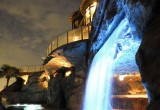
Japanese Sensibility Towards Balance Prevails and The Country Breathes a Sigh of Relief about the National Stadium Issue. Italian entrepreneur, Iacopo Torrini who who's doing amazing things with something that is indubitably Japanese. Much more from the latest news about Japan.
Tokyo, Japan, August 13, 2015 (Newswire.com)
-
What’s the Big Deal About the National Stadium Issue? Japanese Sensibility Towards Balance Prevails
and The Country Breathes a Sigh of Relief. Photo © AFP-JIJI
A New Start for the Stadium and a General Sigh of Relief from the Nation
On-site Reporting by Lee Reeve
Let’s face it. Things don’t always go as planned. Certainly not for the Japan Sport Council (JSC), the group embroiled in the center of the two-year debacle more internationally known as the – now canceled – Tokyo 2020 Olympic stadium. After costs had escalated to the tune of 252bn yen ($2bn) – almost double the original budget, making it the most expensive stadium in modern history – and an unprecedented public outcry, Prime Minister Shinzo Abe was finally forced to pull the plug.
Japanese people are acutely aware of the tiny temporary housing in the Northeast (Tohoku) that remain the permanent “temporary” residence for so many grandmas and grandpas unable to return home because of proximity to the debilitated Daiichi Nuclear Facility. Treasures from the sea and fertile ground made the entire Tohoku area a place Japanese people want to visit on holidays, and many have described Tohoku as a place to see the original and pure beauty of Japan. People who volunteer in these areas unanimously desire resources from around the country to be directed towards the Northeast and the revitalization effort that continues there.
Balance is intrinsic to Japanese sensibility. In the end, a two billion dollar stadium did not balance with the other concerns raw and real around the country. Despite going back to the drawing board on the National Stadium, the spirit of the event and event preparations in Japan have not changed. Bringing the world together in a peaceful display of healthy competition and athletic prowess is what people all look forward to in 2020. A roofed stadium seating 80,000 plus people would be a great advantage to Tokyo for rugby, football (it will clear FIFA requirements) and many other events, and surely the location would continue to bring more and more people together as tourism increases and everyone continues the love of sport. But over two billion dollars? The answer was a resounding "No".
After negative press, criticism, name calling, finger pointing and blaming, the Olympic spirit of unity and harmony prevailed. People are excited to see what the new plans will entail. Yes, it might not be as dazzling a stadium as originally envisioned, but pretty much everyone here seems pleased with the result – people all came together to stop an over-the-top, not absolutely necessary excess.
From the outset, it seems the JSC could have scored many more points with the public by awarding the winning prize to a design that better harmonized with the Japanese aesthetic. Something simple, environmentally conscious and less pizazz-y, if you know what that mean.
As a matter of fact, one the pertinent arguments made by Arata Isozaki, architect of Barcelona’s Olympic stadium, who described the national stadium project as a “monumental mistake” and warned it would be a “disgrace to future generations” was that “Tokyo has the chance to be the first to set a new precedent.” He insisted that the scale of the project was driven by the desire to have an impressive centerpiece for the opening ceremony. His detailed recommendations for how the stadium could be downsized and a separate temporary structure erected for the opening extravaganza outside the Imperial Palace moat, using the Edo castle walls as a dramatic backdrop might have been much more welcome by the general public.
One of the many reasons why peole love Japan has always been the value it places on the simplicity of things. It can be seen all around the country, everywhere, from rice and tea fields to the corporate board room. From traditional items like shoji (rice paper covered sliding doors) to modern interior design, Japan’s appreciation and mastery of simplicity from complexity has always been one of its culture’s strengths. Take Kyoto’s world-renowned “kaiseki-ryouri” (traditional multi-course dinner/haute cuisine) or Japan’s classic kimono, for instance, both brilliantly exemplify the idea of beauty and intricate form in simplicity. Or the inexplicable genius of the one-two-three step package design of a simple “konbini onirigi” (convenience store rice ball), Japan is awash in marvelous modesty!
No wonder then, there was such an outrage by the public over such a flamboyant stadium design, it didn’t fit in at all with the country’s propensity for natural, simple, long lasting and yet, in its own unique way, luxurious. The great news is, it seems that the rest of world is beginning to understand, appreciate, and also incorporate, this sense of aesthetic into their own lives and culture. With Japan design influencing western thinking more and more, I’d say that the Japanese psyche is going international.
In the article below, let’s take a closer look of this thought in action and meet an Italian who’s doing amazing things with something that is indubitably Japanese.
Inspiration can arrive when people least expect it. For architect Iacopo Torrini, the inspiration that would turn his passion into a one-of-a-kind business came while living in New York City as a recent university graduate who spent his days at the Metropolitan Museum of Art as an escape from his cramped city apartment.
Italian-born Torrini left his family’s architectural and design firm behind in Italy to branch out on his own, arriving in New York in 1996. While he found a job quickly, he lacked the opportunity to really show his skills and style, but when wandering the galleries of the Met one day led him to a collection of art from Japan, he knew he found what he’d been looking for.
Torrini is now the owner of Studio Dodici (Dodici Dodici Co. Ltd) and Bartok Design Japan Co., founded in 2003 and headquartered in Kitano-cho, Kobe and his 17 years of experience working in Japan are why we’ve selected him as our featured entrepreneur of the month. Read more here.
Enoshima Island Spa –
Want a romantic getaway with your partner or a girl's day out with a close friend? The couple massage at Enoshima Island Spa's Bengteng Spa will relax, rejuvenate and refresh. To make a reservation with your JI English Speaking team, please contact us via www.enoshimaislandspa.com
For more information on the couple's massage, please take a look at http://insight.japantoday.com/couple-massage-at-enoshima-island-spa/
The Mermaid plan is the most popular plan among first time visitors and on the mermaid plan a Full Day Spa entrance is included with your treatment (access to heated pools (outdoor and indoor), use of relaxation room, hot springs, aufguss sauna experience and more..
http://enoshimaislandspa.com/beng-teng-spa/mermaid-plan/
Jarman International Update:
- Won the first RFP from the US Embassy in Tokyo, which includes doing research on how tourism affects agriculture and hope to share more in the future.
- Rebuilt Japan Technology Report website. Take a look as this is an amazing new resource on tech info from Japan.
- With careful attention to all comments on Trip Advisor, achieved the Certificate of Excellent Award at Enospa and a ranking of 19 out of over 7000 restaurants in Minato-ku for Coconoma Seasonal Dining Restaurant in the Hotel & Residence Roppongi.
- Continue to discover new relocation needs for the best relocation specialist in Japan, H&R Group.
- Are close to receiving orders from two major food chains and three city governments for Deep Japan’s marketing and promotion initiative.
- Have Ji's team page up and running so now you can check out the Jarman team at http://www.jarman-international.com. Nice to have so many wonderful people on the team!
For networking and learning opportunities, please consider signing up as a Senpai at Deep Japan. Please join and help spread the word about Japan and all of its wonderful secrets to the world. Registration is for free at http://www.deepjapan.org/registration
The next DJ Senpai networking meeting will be held on Wednesday, August 19 at the Hotel & Residence Roppongi. As a registered Senpai, you will be eligible to attend. Please come out and be a part of our fantastic group of people who are taking steps to change the world.
More things to do this summer:
Across the Country Beaches
https://www.youtube.com/watch?v=hO-05eCZHI8
Beaches in Japan can be some of the most pleasant locations for finding relief from the hot summer sun and heat. Rest houses, beach houses, cool drinks, activities, and friendly people await you on shores all across Japan. The Deep Japan Senpai writers give you some helpful hints on making the most of Japanese beaches. Click here to read articles at Deep Japan at http://www.deepjapan.org.
Fireworks
https://www.youtube.com/watch?v=6M0eVPWNwC4
In addition to beaches summer in Japan also means fireworks! Summer firework festivals have already begun and will continue on throughout the month. For many, this is not only a wonderful time to celebrate, but also to dress up in summer yukata and wax nostalgic for old-time Japan. Click to read articles at Deep Japan for further details.
Share:




